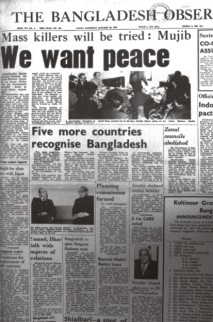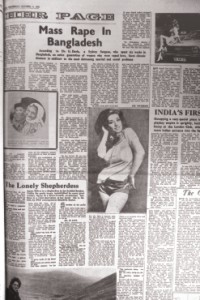|
Musings
Stuck
Kajalie Shehreen Islam
 |
| Bangladesh Observer, January 1972. |
I am stuck in 1972. That is all I think and talk about right now.
For the past month, I have been going through Bangladeshi newspapers of the early 1970s, specifically, late 1971 and 1972, both Bangla and English. It was an exciting time, the post-Liberation days. History unfolds in front of my eyes as I turn the pages with dirty fingers. (There is little to be said about our archives. Not only are all issues not available, but those that are, have pages torn, news and photos cleverly cut out, insects gnawing through them and are steeped in dust that seems almost as old as the papers themselves.) We are liberated; every day new countries are recognising us; we have a nation to build, with our leaders, whom we almost worship at this point, at the helm.
As a former/forever student of journalism, the technical characteristics of the newspapers themselves are interesting to me. The type and size, the splitting of conjoined letters in Bangla, the somewhat archaic language used, the mostly mono colour except for a striking red banner headline now and then, the treatment of different news items according to importance all those years ago. What may seem technical and unimportant to the layperson has special significance for someone much of whose life's work is dedicated to studying the media.
The advertisements are a story unto themselves. The items advertised, from shoes and women's undergarments to books and advertising firms themselves, were quite a contrast from the overload of bank and cellular phone advertisements today. Cinema, even a few days into Liberation, was also an interesting combination of 'Jonglee Meye', 'Arunodoyer Agnisakhsi' and 'Mademoiselle Striptease' and other teasing titles 'for adults only'. 'Her Page' ran stories on 'marrying for money' while many last pages carried large photographs of foreign women with various accomplishments, such as 'new women in the sports world', i.e., some woman who had begun dating some famous footballer or tennis player at the time. International news was enlightening in its own way, with news of the 'Red Indians' in the US, Arab-Israeli political sex scandals and of how long hair had become popular in Mexico.
But the content of the national news is probably what is most striking, not for its contrast from now but rather its similarities. Yes, we have gone beyond dedicating banner headlines and full pages to leaders going and returning from foreign tours, of daily updates of their health and large photos of their recently removed gall bladder stones on the front page. 'Boy turns into girl' does not make a box story on the first page. Politics and society are perhaps somewhat less turbulent in their own ways now that we are a firmly sovereign nation. But a closer look seems to reveal that little has actually changed over the decades.
 |
| ‘Her page’ ran stories on marrying for money. |
Crimes which seemed less in number immediately after Liberation start to swell only four months into it, with villages being looted, children literally having their blood sucked out of them and women and men being hacked to death. News of the electricity and water crises make one double-check the date of the paper to make sure it is not today's. Divergence of opinions was only beginning to split politicians into factions in those newly-independent days. Poverty, food crisis and volatile prices of essentials hardly seem like history. The furore over the trial of war criminals was louder than it has ever been in the last three decades, except perhaps for the last few years. The roots of corruption seem to be sprouting at that time.
In a way, history is reassuring. I read a story on how Libya refused to attend the Cairo Conference in 1972 because Bangladesh would be participating in it and I think of the country now, where I spent five very pleasant years of my childhood, and its relations with Bangladesh now, or even, and more surprisingly, the UK and US. Everything works out in the end, they say. China, the country against which the largest protest movement occurred after Liberation up until that time for its veto against Bangladesh's inclusion in the UN, is now a friendly nation. The Vietnam War is over (though replaced by Afghanistan and Iraq, Nixon by Bush and Obama).
History is also reinforcing. When I read about the establishment anniversary of a political party's student wing in the dark and dusty paper section of my library and come outside to find the same party bringing out a celebratory procession on the street exactly 37 years later, it is almost like being hurtled back into history. The same leaders or else their clan being in the news today may show stability or tenacity, depending on how one looks at it. Foreign leaders continue to visit and leave after 'fruitful' talks, relationships that were new then are strengthened now; others are still looked upon with suspicion.
Those were the days of building our nation. Forming a government, writing the Constitution, establishing various bodies to see to the welfare of different aspects of society. And, along with everything else, making endless promises to end poverty, crime and instability; to try the war criminals and collaborators who opposed and worked against the independence movement; to provide a secure life for the country's citizens.
It is encouraging to see in newspapers today the reflection of protests against the power crisis, the movement for the trial of war criminals, etc. But having to go through papers from almost four decades ago to see that people were fighting for the exact same things for which we fight today is disheartening to say the least. We had many expectations from our newly liberated country, but we were not naive enough to believe that change would take place overnight, especially after the breaking of the nation's economic and intellectual backbone during the war. But 37 years later, people did expect some change. Yes, history repeats itself, but in our case, the question is whether we have ever been able to get beyond our history, to building a safe and secure future for our people. So little seems to have changed.
As I turn the pages of 1972, I feel closer to that time than I had expected myself to be, almost four decades later.
Am I the only one stuck in 1972?
Copyright (R) thedailystar.net 2009 |
